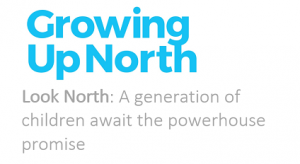Anne Longfield, the Children’s Commissioner for England, is today (Monday) publishing ‘Growing Up North’, a year-long report looking at the issues and experiences of children growing up in the North today.
‘Growing Up North’ is the culmination of twelve months of research, analysis and conversations with children, schools, business, councils, health professionals and charities. It is designed to increase understanding of children’s attitudes, aspirations and expectations, look at the progression of children from early years to early adulthood and assess the opportunities provided by the Northern Powerhouse to children growing up in the North (Yorkshire and the Humber, North West and North East).
It is an optimistic report that praises the ambitions of the Northern Powerhouse project, but it also warns that many of the most disadvantaged children in the North are falling far behind their equivalents in the South, particularly children growing up in London. They are less likely to do well in secondary school, more likely to go to a poor school and more likely to leave education early. While some parts of the North have some of the best primary schools in the country, many secondary schools are struggling. The report calls on the Northern Powerhouse Project to give children the same attention as economic regeneration, otherwise the promise of the Powerhouse will not be realised.
The report includes the views and experiences – both positive and negative – of children growing up in the North. Some are unsure how regeneration would improve their lives.
“They’ve done up the main thing to make it look nice, rather than getting things done that will actually benefit us.” Child in Northumberland
Others feel positive about recent changes.
“It has definitely got better in the last five years. There’s loads more to do than there was before and there are lots of new shops.” Child in Sheffield
And most are proud of where they live.
“I think Manchester is a good place to grow up. There’s different things around every corner” Child in Manchester
Some of the main findings in ‘Growing Up North’ include:
- Northern 2 to 3 year olds are more likely than their London counterparts to attend nursery – but are less likely to reach the expected standard of development when starting school.
- More than half of the schools serving the North’s most deprived communities are below a ‘good’ rating. This means children in these communities face the double-disadvantage of being from a poor community and attending a poor school. Schools in these ‘cold spots’ are facing the same problems: weak leadership, poor governance and difficulties recruiting staff.
- Many more children in the North than nationally are starting school with high-levels of development issues, but fewer children are having special educational needs diagnosed before they start school.
- High numbers of children across the North are dropping out of school too early, missing vital parts of their education and undermining their future prospects
The report’s recommendations include:
- Improving the North’s secondary schools in the most deprived areas. This needs to be a priority and there needs to be far more of a concerted effort to tackle the issues that hold schools back. A renewed focus on teaching recruitment and leadership is needed. Cities with big graduate populations should be encouraging graduates to stay and work where they have studied and doing more to attract the best teachers to areas that most need them.
- Every local area needs to have a plan to ensure children are in apprenticeships, training or education until 18. Regeneration and education need to be brought together to give children clear pathways into the workplace. Funding reform is needed to avoid unnecessary choices such as: between ‘a school nurse and a geography teacher. Our kids need the school nurse more’. (p34 G.U.N.)
- The creation of “Growing Up North Forums”, similar to a Local Enterprise Partnerships, and which brings together all the bodies working with children: local authorities, education providers, employers, health bodies, voluntary sector and the police.
Children growing up in the North love and are proud of the place they live. They want a future where they live near their family and community and they want jobs and opportunities to rival anywhere else in the country. The Northern Powerhouse and the new devolved mayors provide a once in a lifetime opportunity to drive that ambition.
While many children in the North are thriving, there are huge gaps between the poorest Northern kids and those in the South. Too many children in the North are facing the double-whammy of entrenched deprivation and poor schools. They are being left behind. We need to ask why a child from low income family in London is three times more likely to go to university than a child who grows up in Hartlepool.
The Northern Powerhouse will only succeed if children are put at the heart of the project. If the North is to flourish it needs to grow and retain the talents of all its children and truly offer the opportunities in life they hope for.






